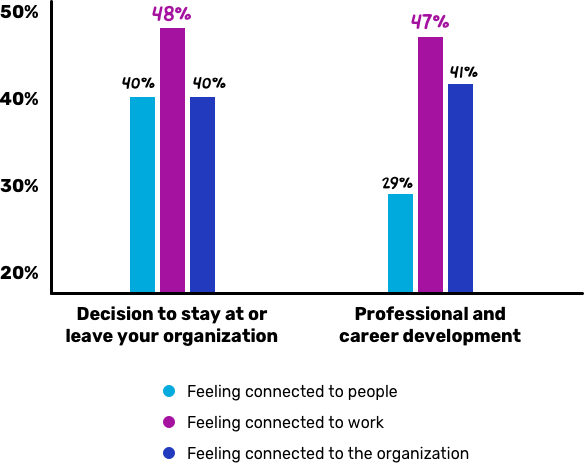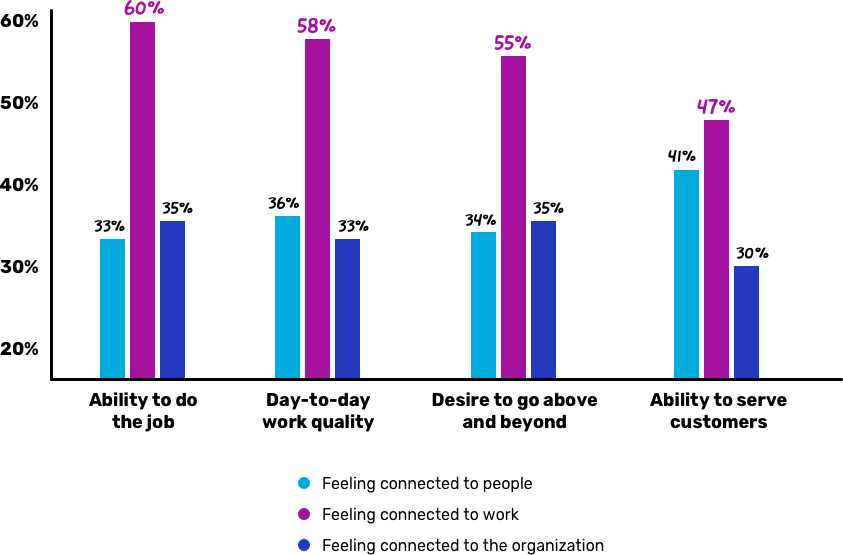Report
Fostering employee connection beyond relationships delivers big business results

Related services and insights
Talent5 steps to improve employee connection and boost organizational performance
Eagle Hill Consulting’s latest survey reveals that nearly half (45%) of employees don’t believe their organization is investing in initiatives to support employee connection. What are companies missing when it comes to employee connection?
Before the pandemic, conversations about employee connection were rare. Leaders assumed that employee connection happened organically as people and teams worked together toward shared goals and in alignment with the organizational culture. It was as if fostering employee connection happened automatically, through sharing organizational culture and values, holding happy hours, and other team building events.
But things have changed. In a tight labor market and with the embrace of hybrid and remote work, organizations are seeing the impact employee connection can have on employee retention. As a result, employee connection has become a priority—a key aspect of the employee value proposition and a driving force behind a healthy work culture, greater collaboration, innovation, and knowledge sharing. All these factors are key competitive differentiators for organizations and a major consideration for employees when deciding to leave or stay with an organization.
Employee connection isn’t just about relationships
Many organizations have taken too narrow of a view of employee connection, defining it purely in terms of employee relationships with their peers, teams, managers, and leaders. This view doesn’t account for the bigger picture of what matters to employees when it comes to feeling connected to their organizations. It creates a gap between how organizations think about employee connection and what employees truly care about.
Employee connection is multi-faceted. In addition to employees’ relationships at work, it includes how connected employees feel to the work they do each day and the degree to which they feel aligned with the culture.
To learn how workers feel about employee connection, we surveyed more than 1,000 full- and part-time employees across the United States.

What is employee connection?
Employee connection is a sense of belonging in the workplace grounded in several aspects of employee experience:
- Connection to work: having a sense of satisfaction and purpose day-to-day
- Connection to people: developing relationships with peers, teams, managers, and leaders
- Connection to culture: feeling that personal values align with the culture, mission, values, and norms
Connection to work matters most to employees
Despite the isolation of working at home during the pandemic, the data shows that connection to work—having a sense of purpose and belonging—still matters most to employees for job satisfaction (Figure 1).
Figure 1: Employees’ connection to their work has the greatest impact on overall job satisfaction
Q: Which of the following impacts your:

Source: Eagle Hill Consulting Employee Connection Survey 2023
The data also reveals that employees’ feeling of connection to work isn’t just good for them: it’s good for their organizations too. An intentional focus on connection to work has a greater impact (compared to connection to people or culture) on improving job performance in day-to-day work quality, ability to serve customers, and desire to go above and beyond (Figure 2).
Figure 2: Employees’ connection to their work has the greatest impact on their job performance
Q: Which of the following impacts your:

Source: Eagle Hill Consulting Employee Connection Survey 2023
Employee connection comes down to purpose
Despite the clear benefits for employees and organizations, nearly half (45%) of employees don’t think their organizations are investing in initiatives to support employee connection. This perceived lack of investment and concern for employee connection is a risk. Organizations can’t get complacent, especially given the tie between employee connection and employee retention.
As organizations develop more intentional employee connection strategies, it’s critical to understand that fostering employee connection is about more than hosting happy hours and social events. While relationships and culture matter to employees, what they ultimately want is to feel a sense of purpose and connection to their work. This feeling can improve employees’ self-worth and value in the organization, and in turn benefits organizations through greater discretionary effort, morale, and innovation.
In today’s environment, organizations should make meaningful investments in fostering employee connection to retain their people, increase job satisfaction, and boost organizational performance. Employee connection strategies should be grounded in what employees value most—which is connection to work and organizational purpose.
Methodology
The survey was conducted online by Ipsos the week of January 3-5, 2023. The survey included 1,362 adult respondents from a random sample of full- and part-time employees across the United States. The survey polled respondents to understand their feelings about employee connection as well their views on what actions employers can take to create more employee connection in the workplace.

